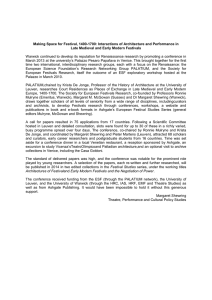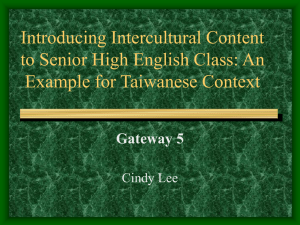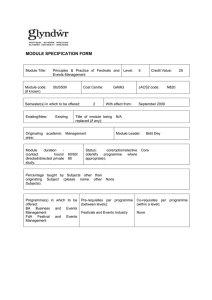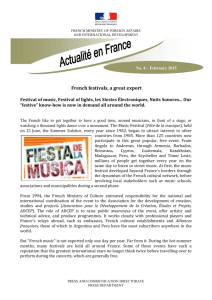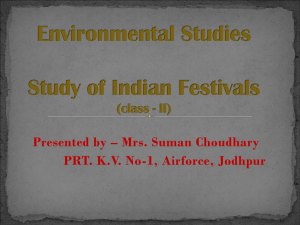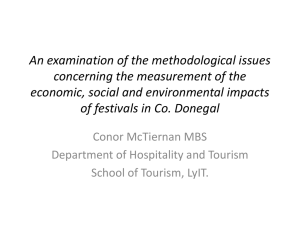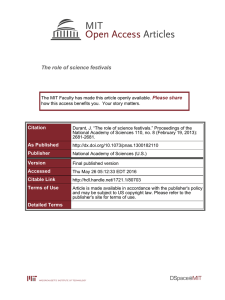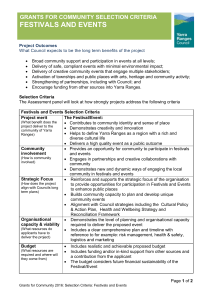SCIENTIFIC WORKSHOP REPORT ESF EXPLORATORY WORKSHOP Standing Committee for the Humanities
advertisement
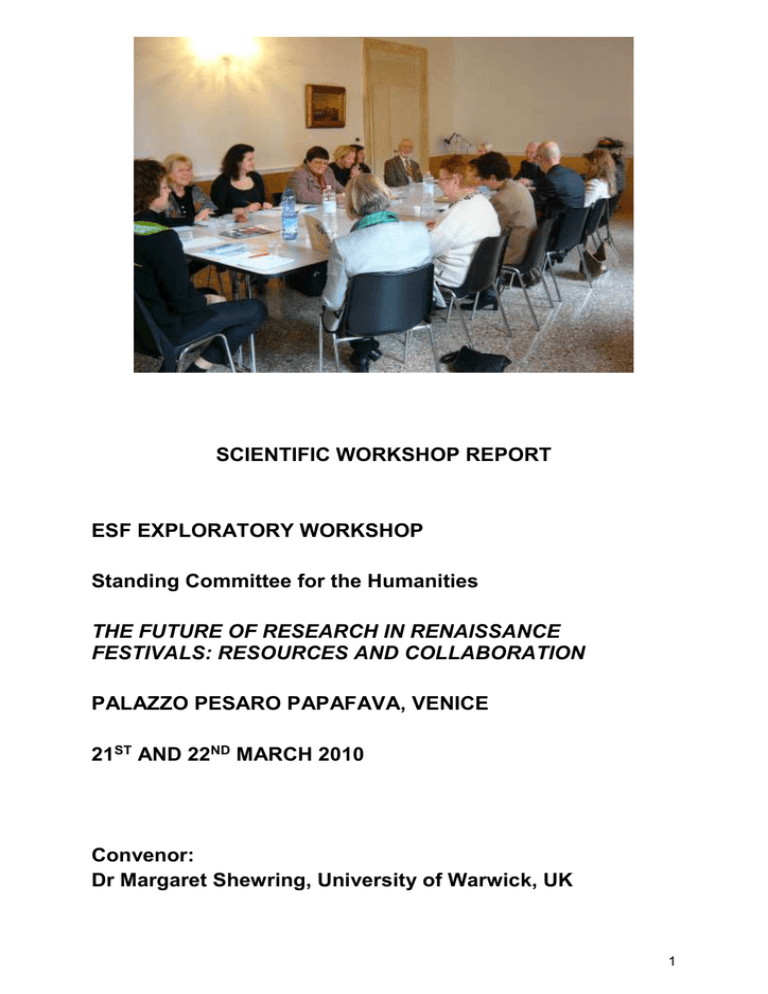
SCIENTIFIC WORKSHOP REPORT ESF EXPLORATORY WORKSHOP Standing Committee for the Humanities THE FUTURE OF RESEARCH IN RENAISSANCE FESTIVALS: RESOURCES AND COLLABORATION PALAZZO PESARO PAPAFAVA, VENICE 21ST AND 22ND MARCH 2010 Convenor: Dr Margaret Shewring, University of Warwick, UK 1 CONTENTS Executive Summary Scientific Content 1) Welcome 2) ESF Presentation 3) Introduction 4) Documentary and Visual Archives 5) Digital Resources 6) Translation and Dissemination 7) Ways Forward 8) Funding Opportunities 3 4 4 4 5 6 7 7 9 Assessment of Results 10 Workshop Programme Workshop Participants Statistical Information 13 15 16 Appendix A Ronnie Mulryne and Margaret Shewring Appendix B David Sánchez-Cano Appendix C Mårten Snickare Appendix D Lena Rangström Appendix E Lucia Nuti Appendix F Camilla Cavicchi 17 19 20 21 22 23 2 1. EXECUTIVE SUMMARY The Workshop and its participants This Exploratory Workshop enabled 16 contributors to meet for two days (21st and 22nd March 2010) at the Palazzo Pesaro Papafava in Venice. The contributors, ten women and six men, came from a range of disciplines and seven different countries – the UK, France, Italy, Spain, Germany, Sweden and the USA. Their professional backgrounds spanned academic, library and archive, museum and gallery specialisms. Practical Arrangements The first floor of the Palazzo Pesaro Papafava houses the University of Warwick’s research and teaching base in Venice. Located in the Cannaregio sestiere, it overlooks the Misericordia Canal and is within a short distance of excellent hotel accommodation and attractive restaurants. The Workshop was held in a large meeting room, with views over the Palazzo’s garden. This room was equipped with a laptop and projection facilities. Refreshments for the morning and afternoon breaks were served in the grand salon of the Palazzo, immediately adjacent to the meeting room. Warwick’s administrator in Venice, Chiara Farnea Croff, took care of day-to-day arrangements as well as booking hotel accommodation (at the Giorgione, the Ai Mori d’Oriente and the Domus Ciliota) and meals in local restaurants. Lunch and dinner arrangements allowed the Workshop participants to continue their discussions in a less formal environment. Aims and objectives Recent years have seen marked progress in the scientific study of Renaissance Festival. It was, therefore, timely to bring together leading experts in the area of Festival Studies, with early and mid-career researchers, to explore initiatives for the future, taking in manuscript, printed, digital and material resources. The aim of the Workshop was to encourage and facilitate effective collaboration towards making accessible the material resources, and identifying the opportunities, to take forward Renaissance Festivals research on an interdisciplinary and pan-European basis. As a relatively new and multi-disciplinary scientific area, the study of Renaissance Festival needs a well-understood common discourse that will permit new and established scholars to communicate successfully, and to develop a theoretical language that will make possible productive case-studies as well as wide-ranging analytical assessments across disciplinary boundaries, drawing on cultural, social, political and economic history, through languages and literatures to studies in the fields of theatre, scenography, dance, musicology, architecture, heritage and the visual arts. Outcomes The Workshop provided an opportunity to achieve a measure of agreement among international participants on the most effective ways of disseminating current and future research to a wider public by way of exhibitions and printed and visual media together with electronic means including websites, CDs and DVDs, pod-casts, radio and television. These would be supplemented by funded translation, in particular with a view to making Festival texts in the less familiar European languages (Polish is an important example) available to the generality of researchers across Europe. Agreement was reached on future collaboration and the publication of research (see below). 3 2. SCIENTIFIC CONTENT OF THE WORKSHOP Detailed Summary 1) Welcome by the Convenor, Dr. Margaret Shewring. 2) Presentation of the European Science Foundation. Arianna Ciula drew attention to: the EUROCORES Programme the need for research infrastructures, and for digital resources in particular, on a national and international basis. the highly competitive Research Networking Programme the European Co-operation in Science and Technology Programme (COST), funded through national agencies PALATIUM: an initiative currently being supported with which Festivals research might profitably co-operate (first meeting June 2010) a strategic focus on music and musicology the desirability of attracting younger scholars into Humanities research programmes. 3) Introduction: Where we are now. Ronnie Mulryne summarised Festivals research, noting that the area had over recent years emerged as a shared and distinctive enterprise across European countries and further abroad. Summary: The ESF has played a part in this development, specifically by funding conferences held in 2000 and 2003 at Castelvecchio Pascoli, Tuscany, the first of which led to the collaborative volume of scholarly essays, Court festivals of the European Renaissance: Art, Politics and Performance, edited by J. R. Mulryne and Elizabeth Goldring (Aldershot and Burlington VT: Ashgate, 2002), a volume which was very well received in the research community and by reviewers. This volume accompanied and benefited from other major advances including the bibliographical survey, Spectaculum Europaeum, edited by Pierre Béhar and Helen Watanabe-O’Kelly and the 2 volume Europa Triumphans: Court and Civic Festivals in the Renaissance, edited by J. R. Mulryne, Helen Watanabe-O’Kelly and Margaret Shewring (Aldershot and Burlington VT: Ashgate, 2004) with its edited transcription, translation, annotation, illustration and commentary relating to festival books from eight different countries in Europe and South America. A recent addition to the scholarship of Festival is Iain Fenlon’s The Ceremonial City: History, Memory and Myth in Renaissance Venice (New Haven and London: Yale University press, 2007). These printed texts and studies have led to publication by electronic means. Europa Triumphans has recently been re-published as an e-book (February 2010); a major collection of 253 Festival books is now available in digitized form on the website of the British Library as the result of a collaborative project led by J. R. Mulryne and Margaret Shewring with funding from the Arts and Humanities Research Council (Britain); further work is going forward on websites hosted by the Warburg Institute, University of London, and the University of Warwick. Cognate significant developments have been undertaken at the Herzog August Bibliothek, Wolfenbüttel, where a major collection of Festival texts has been online for a number of years and is constantly evolving. An important and relevant initiative is the Medici project directed by Manfred Piccolomini (Florence). There are high expectations related to the development of Europeana, an ambitious open-access on-line resource. 4 These materials provide a means of accessing previously barely-accessible texts with varying levels of searchability. Some initial collaboration has taken place to secure common standards and keyword search terms but this is an area in which further discussion is now essential. Rich repositories of Festival-related materials exist in such collections as the Kupferstichkabinet (Dresden), Schloss Ambras (Innsbruck), the Nationalmuseum and the Royal Armoury (Stockholm), Versailles and the Loire Chateaux (France) and the Musei Civici (Venice). Opportunities for collaborative study of these materials exist and, if appropriately pursued, will bring to scholarly notice important new knowledge of a trans-European kind. Discussion: Future needs include the provision of translations from less-widely-spoken European languages (including, in particular, Polish, with its rich Festival tradition). The importance of quality control in the area of translation was emphasised by members of the Workshop. Sydney Anglo reminded the group that a formidable range of Festivals material is not yet available in modern printed or digitised form. Means should be devised to make as much of it as possible convenient to access. Lena Rangström and Mårten Snickare observed that much manuscript material including financial accounts and eyewitness reports is not readily accessible, nor are costumes, paintings and objects of all kinds. Margaret McGowan indicated that there is a need to enhance the documentation of Festival through themes and common iconography, continuities across borders, shared personnel and cross-disciplinary, cross-national approaches. Margaret Shewring confirmed the focus for discussion as the ‘long Renaissance’, from approximately 1450-1750. ESF representative Arianna Ciula highlighted the value of post-doctoral research and the importance of introducing new and mid-career scholars into the relevant research area. 4) Documentary and Visual Archives All workshop participants contributed short statements to this session. Key points included: Expanding the Scholarly Research Network Mara Wade is actively engaged on projects providing digital resources for the Humanities (in particular Emblem Studies). A global standard for the analysis of resources is needed. Languages David Sánchez Cano noted the changing culture in Humanities publication, in particular the increasingly important status being given to languages as expressions of national culture. Scholarly levels and technical support It is important to engage the most advanced level of technical support, especially in the preparation and dissemination of digitized resources. Margaret Shewring noted that it can be particularly productive to link related sites and share, for example, keywords and glossaries. Visual Archives Lena Rangström drew attention to the importance of armour and costume collections in understanding and interpreting Festival culture (see Appendix D). Helen Watanabe-O’Kelly and Evelyn Korsch noted the armour, objects and costumes in Dresden as well as the wellknown Kupferstich-Kabinet or ‘cabinet of curiosities’. Collections of Printed Materials Evelyn Korsch summarised the importance of state archives and civic collections, including collections of printed books, drawings and artworks depicting Festival events (e.g. in Venice). 5 Melanie Zefferino noted that a number of National archives have inventories of their collections online. For example, the SIAS (Sistema Informativo degli Archivi di Stato) website now provides links to all local archives in Italy. Helen Watanabe-O’Kelly pointed out that for German books it is possible to find out the contents of libraries from the Handbuch der historischen Buchbestände in Deutschland, Österreich und Europa edited by Bernard Fabian. Mårten Snickare noted that there are few resources for the study of Festival culture in Sweden in the 16th century. There are rather more for the 17th century in printed, visual and various National collections. Ronnie Mulryne reminded the group that while good bibliographies exist to guide scholars to library collections (e.g. Helen Watanabe-O’Kelly’s work), there is no parallel guide to relevant material collections. Camilla Cavicchi outlined resources available for musicologists. Soundscapes need to be studied ranging from circumambient noise to elaborate musical compositions, taking into account singing and reciting (see Appendix F). Lucia Nuti discussed and underlined the importance of developing research in Renaissance cartography (see Appendix E). 5) Existing Digital Resources (available resources were listed by Members of the Workshop): Research can be accessed on the url http://134.76.163.162/fabian. Literature in several languages available in libraries worldwide relating to festivities can be found in the “KVK Karlsruher Virtueller Katalog”: www.ubca.uni-karlsruhe.de/kvk.html. Alenda y Mira’s Bibliography of Spanish printed books and manuscripts (1903) can be supplemented by using the on-line bibliography, Catálogo Colectivo del Patrimonio Bibliográfico Español. Valuable materials are available online via the British Library and the Herzog August Bibliothek sites. Reference was made to the HERLA Project directed by Cristina Grazioli (Umberto Artioli Foundation, Mantua). Several smaller projects exist including the Renaissance Festivals Database (http://go.warwick.ac.uk/theatre/research/festivals/), developed by Margaret Shewring, a complementary resource to the British Library Renaissance Festivals website and the ReCreating Early Modern European Festivals project led by Laura Fernandez-Gonzalez, hosted at Edinburgh http://www.recreatingearlymodernfestivals.com Mara Wade suggested the usefulness for the ESF group of starting with a pilot project that could establish a portal for both ‘vertical’ and ‘horizontal’ searches. Discussion of Ways Forward: Margaret McGowan discussed the importance of going further than collection and digitisation of resources, through encouraging critical analysis across disciplinary as well as geographical boundaries. An online discussion board on a festivals website hosted by the University of Warwick linked to the ESF site was suggested. An experienced web-master at the University, Mr Robert O’Toole, will be approached to develop the site. A New Resource The compilation of an on-line, incrementally-compiled, Handbook to collections, printed, archival and material, across a wide range of countries, including Europe and North America, was proposed. 6 Arianna Ciula noted that the FP7 programme has a specific call for research infrastructures that make use of historical archives. Face-to-face discussion will, nevertheless, be invaluable in developing Festival studies, bringing organizational, scholarly and technological expertise to bear. A Steering Group (incorporating participants in the ESF Exploratory Workshop) will seek funding to facilitate individual networks. Arianna Ciula suggested bids for research support, perhaps at the postdoctoral level. 6) Translation and Dissemination of Source Materials David Sánchez-Cano identified key issues related to translation. (Appendix B) He will draw up an on-line list of glossaries of 16th century terms. Other members of the workshop will identify resources for specialist glossaries and terms (e.g. Helen WatanabeO’Kelly in relation to tournaments). David Sánchez-Cano will list dictionaries that are particularly helpful for Festival studies (a number of 16th century dictionaries are available on line). E-editions can provide access to different versions of unusual words and references (specialist terms, proper names, etc) and can permit translated versions to be seen alongside the original. 7 Discussion and ways forward: Europa Triumphans is now available as a fully-searchable e-book. Mara Wade suggested linking the texts in Europa Triumphans to on-line versions of the complete source texts, thus building on existing scholarship and expertise. Margaret McGowan has begun work on a general framework for Festivals, devising a ‘map’ into which specific case studies might fit. It should be possible to build into this frame details not just of genre, but also of archival, visual and aural resources, and of theoretical texts from the time of the relevant festival(s), together with helpful linguistic information and glossaries. (Professor McGowan has subsequently circulated a draft General Framework to Workshop members.) Maria Ines Aliverti pointed out that the choice of case studies has, in itself, a strategic aspect, as the selection may well have a bearing on future research and funding opportunities. A first case study could draw on the French/ Spanish weddings of 1612/1615. The festivals associated with these weddings cross geographical boundaries as well as embracing a rich variety of materials and disciplines. (Professor McGowan has subsequently circulated a draft to Workshop members.) The resources available on the British Library site (Treasures in Full, Renaissance Festivals) could be enhanced by offering brief summaries/abstracts of the content of each Festival text, including those in English, as a way of assisting readers to find material relevant to their research. Evelyn Korsch, Margaret Shewring and Ronnie Mulryne agreed to provide examples of such summaries. Members of the workshop agreed to take on a selection of books (perhaps ten each) in the light of these examples. Monique Chatenet outlined the PALATIUM initiative. This covers 1400 to 1700 and is crossdisciplinary, with a focus on art and architecture utilising 3D techniques. She suggested establishing future links between PALATIUM and the current ESF Workshop project. 7 Arianna Ciula is the ESF contact for the PALATIUM project. This is an open programme. There will be calls for seminars after the initial meeting in June (though these will be restricted to nationals of those European countries funding the programme). Mårten Snickare asked how best to engage students and younger scholars with festivals research (see Appendix C). He suggested a publication with a title such as Performativity, ambition and culture in Early Modern Europe or Identity and Self in Early Modern Festivals. These aspects of Festival studies are of particular interest to today’s students and young researchers. Mårten agreed to develop a proposal and will bid for a conference to make festival study more accessible. (Email discussion of the proposed publication since the Workshop, between Mårten Snickare, Ronnie Mulryne, Margaret Shewring and Margaret McGowan, has produced a set of suggestions for chapters and sections.) Melanie Zefferino drew attention to puppetry as an aspect of festival activity and tabled a summary of her research programme: ‘Puppet Theatre in Renaissance Festivals: Beyond the Court’. Arianna Ciula drew attention to funding for Summer Schools in the Humanities. These could range from 3 days to several weeks and could serve to engage younger scholars in Festivals research. Ronnie Mulryne and Margaret Shewring proposed a Society for European Festival Research. (Subsequent consultation led to a draft informal Constitution (Appendix A).) Ashgate Publishing is willing to consider proposals for annual publications related to Festival Studies. Ronnie Mulryne and Margaret Shewring agreed to set up a meeting with Rachel Lynch, Managing Director of Ashgate Publishing Ltd., to explore publication possibilities. (The meeting has subsequently taken place and a report circulated suggesting future publications, published simultaneously in both hardback and ebook format.) A working group, initially including Ronnie Mulryne, Margaret Shewring, Monique Chatenet, Mårten Snickare, Margaret McGowan, David Sánchez-Cano and Evelyn Korsch, will draw up proposals for the first three multi-authored volumes. A larger advisory body to oversee the publication programme will comprise the current ESF Exploratory Workshop group with a small number of additional consultants (e.g. Ines Aliverti suggested Dr. Francesco Cotticelli). (Dr Cotticelli has subsequently corresponded with Professor Mulryne.) A series of shorter publications outlining key aspects of Festival study, with such titles as Festivals and History, Festivals and Works of Art, Festivals and Costume, Festivals and Music, Festivals and Theatre, and Festivals and Politics might be targeted at young scholars and researchers. An annual (or twice-yearly) Newsletter might be made available on line, using the proposed website hosted at Warwick. Margaret Shewring suggested that it could be valuable to extend our outreach to broadcast media, exhibitions and podcasts. Helen Watanabe-O’Kelly and Lena Rangstrőm agreed that such ventures could help to draw the attention of new researchers, as well as the general public, to the developments and opportunities of Festival Studies. The musicians who perform as Mascherata (Catherine Groom, Adrian Horsewood, Richard Mackenzie) might be willing to permit a recording of their ‘Intimate music for Henri III’, performed for a conference on Waterborne festivals, to be made available via u-tube, linked to the new Warwick website. The working group agreed to consult the rest of the group regularly (in reports and updates) as well as to make use of the proposed web-site for forwarding discussion of new projects. 8 8 Funding Opportunities: Arianna Ciula pointed out that a call for funding (deadline October 2010) has opened for the establishment of European Networks. Multiple applicants from various countries will be eligible. If a bid for a contributory conference is successful the applicant(s) will be assisted in its organization by the ESF. We should consider proposing a conference to further the work on 1612/1615. If the ESF supports a publication it will also support the payment of copyright for illustrations. The group asked the ESF to lend its support to a thorough review of copyright costs, especially for illustrations. Margaret Shewring agreed to explore UK funding opportunities. 9 3. ASSESSMENT OF THE RESULTS OF THE WORKSHOP AND CONTRIBUTION TO THE FUTURE DIRECTION OF THE FIELD Results included the following: Recognising that a critical opportunity had arisen to take forward research on Renaissance Festivals, on a transnational and interdisciplinary basis, members of the Workshop agreed to set up a Society for European Festivals Research. An outline proposal is attached as Appendix A. It was agreed that: A publications programme will be established in partnership with Ashgate Publishing Ltd.. This will incorporate: an annual series of monograph-length collaborative volumes (100,000 140,000 words). The first of these, Waterborne Pageants and Festivities of the Renaissance, edited by Margaret Shewring, will appear in Autumn 2011 (contract issued, and work now advanced); the second, edited by Margaret McGowan, will focus on French/Spanish dynastic weddings 1612/15 (publication Autumn 2012); a third, edited by Mårten Snickare under the working title New Approaches to Renaissance Festival will concern the negotiation of Cultural Identities, Postcolonial theory, Europe and the Other and Performativity, Identity and Gender, and will appear in Autumn 2013. A volume on Music and Musicologyin Relation to Festivals is under discussion. a multi-author Companion to European Festivals Research, of up to 400 pages in length, edited by Margaret McGowan, Ronnie Mulryne and Margaret Shewring, and based on a comprehensive ‘map’ of existing research publications together with printed, electronic, musical, scenographic and material resources, will be published in the Ashgate Research Companions series (target date, 2012-14). All publications will be issued simultaneously in printed and e-book form. It was further agreed: to hold follow-up annual interdisciplinary and transnational conferences related to the publications programme, to be held in different European cities, with the participation of invited experts from academic, library, museum and musical backgrounds. to set up a dedicated web-site, hosted initially by the University of Warwick with support from Ashgate Publishers, to permit scholars to pose and answer research questions, exchange information, and report on research progress including publications and conferences to enhance existing digital resources, including those on the British Library website, by providing summaries of the 253 festival books hosted there, and by seeking funding to add further volumes from major archives world-wide. A Workshop sub-group will assume responsibility for taking this initiative forward. to take further steps to promote the translation of festival texts, including the provision of appropriate scholarly apparatus relevant to translation 10 and an international glossary of specialist terms, accessible on line (see Appendix XX) to develop the documentation of festivals for which published festival books have not survived and to disseminate knowledge of collections of material objects relevant to festivals scholarship in such collections as the Royal Armoury, Stockholm, the Kupferstich Kabinett, Dresden, and Schloss Ambras, Innsbruck to promote further awareness of digital resources such as the Medici Archive, Europeana and the Internet Archive to make better known the range of printed resources such as the Handbuch der historischen Buchbestände in Deutschland, Österreich und Europa (ed. Bernard Fabian), together with manuscript resources in local and national archives and drawings of costumes, scenography etc to promote wider public awareness of festivals by encouraging and where possible facilitating exhibitions and related catalogues, together with broadcast programmes on radio and television and in podcast form to establish contact with organisations with similar scholarly interests such as the Herla project (Turin), the ESF-supported PALATIUM initiative and the Re-creating Early Modern Festivals programme hosted at Edinburgh (several Workshop members are enrolled for the programme’s July conference) As matters of policy it was agreed: to continue to press for clarification of, and consistency in, copyright law, Europe-wide, as it relates to permission to reproduce visual material held by archives, museums and galleries, and as it affects the costs of academic research on, and publication of, this material to identify and draw on high-level expertise in on-line and digital technology, in order to secure the highest standards of scholarly output in digital and on-line form and to seek to establish common practices in, for example, the use of search terms to encourage further study of music and musicology as they relate to festival performance, from music by well-known composers to nonwritten traditions and the informal ‘soundscapes’ of outdoor events (see Appendix XX) to foster the cartography of cities including ephemeral architecture as elements of festival research (see Appendix XX) as a matter of urgency to draw postgraduate students and early-career researchers into the study of festivals It was agreed to take urgent steps: to pursue funding opportunities in support of international and interdisciplinary festivals research in this regard to follow up the opportunities provided by the ESF portfolio of programmes, in particular the Research Networking Programme (deadline 14th October 2010); the Research Conferences Programme (deadline 15th September 2010) and when available and if applicable the EUROCORES Collaborative Research Funding programme to explore the potential support of national funding agencies under the FP7 programme as it might relate to archival curation and conservation, especially in regard to the support of doctoral and immediately postdoctoral students linked to members of the festivals research group. 11 Follow-up actions since the Workshop include: discussions with Ashgate Publishers to confirm the company’s interest in the publications programme as outlined. A formal contract has been issued for the Waterborne Festivals volume, detailed plans have been agreed for the Companion volume (authors are being contacted) and the Dynastic Weddings volume is agreed at the level of chapter break-down and assigned authors Ashgate Publishers have confirmed an interest in research exhibition catalogues through their Lund Humphries imprint a ‘constitution’ for the Society for European Festivals Research has been drawn up and is under discussion with Workshop members and other scholars (Appendix A) contact has been established with the ‘Re-creating’ group (Edinburgh; Laura Fernandez Gonzalez), with the Herla project (Cristina Grazioli, Mantua) with the Director and senior staff at the Centre d’Etudes Supérieures sur la Renaissance (Philippe Vendrix, Camilla Cavicchi, Tours) and with the University of Dresden (Evelyn Korsch). Email contact has been initiated with the Director of the PALATIUM project (via Monique Chatenet) steps have been taken to establish a website at the University of Warwick, with a url assigned in readiness for sharing access with Workshop members and others a network of email contacts has been established and detailed discussions have taken place between Workshop members (and with Arianna Ciula) concerning ways to take the project forward further discussions will be held with Workshop members attending the Edinburgh conference (6-7 July; Evelyn Korsch, David Sanchez-Cano, Ines Aliverti, Lucia Nuti, Ronnie Mulryne, Margaret Shewring). A session has been set aside to report on the Workshop and its outcomes, including the establishment of a Society. A representative of PALATIUM will be in attendance at the Edinburgh Conference. a proposal for an ESF Research Networking Programme will be developed for submission by the deadline in October discussions will be held concerning the feasibility of an application for funding under the ESF Framework Programme discussion of potential exhibitions have taken place, including with Pieter van der Meuwe of the Maritime Museum, Greenwich, UK 12 4. FINAL EXPLORATORY WORKSHOP PROGRAMME Sunday 21st March 2010 10.30-11.00 Registration and Coffee 11.00-11.10 1) Welcome by Convenor, Dr. Margaret Shewring. 11.10-11.30 2) Presentation of the European Science Foundation (ESF) Dr. Arianna Ciula, Standing Committee for the Humanities (SCH) 11.30-12.30 3) Introductory Session: including a series of brief introductions outlining the topics to be discussed during the workshop and the questions to be addressed about the content and scope of future research and related developments. Professor Ronnie Mulryne. 12.30-14.00 Lunch 14.00-15.30 4) Afternoon Session: Documentary and Visual Archives Brief presentations followed by whole group discussion led by Professor Ronnie Mulryne and Dr. Margaret Shewring. 15.30-16.00 Coffee / tea break 16.00-17.30 5) Digital Resources: Brief presentations followed by whole-group discussion on Ways Forward led by Professor Margaret McGowan. 17.00 Dinner Monday 22nd March 2010 09.30-11.00 6) Morning Session: Translation and Dissemination of Source Materials for Renaissance Festival Studies Dr. David Sánchez-Cano and Professor Helen Watanabe-O’Kelly. 11.00-11.30 Coffee / Tea Break 11.30-13.00 7a) Discussion: Future programmes of digital resource enhancement Future developments in galleries, museums, collections and heritage sites Dr. Lena Rangstrőm. 12.30-14.00 Lunch 14.00-15.00 7b) Afternoon Session: Ways forward Discussion of plans for future interdisciplinary and transEuropean collaborations 8) Discussion of funding possibilities for: documentary and digital archives; visual and performance research; curating, conservation and heritage developments; research and the broadcast media; dissemination of research and its accessibility beyond the academic community 13 15.00-16.00 9) Concluding Session including summary of future actions and follow-up activities/networking/collaboration 16.00-16.30 End of Workshop and departure A poster display of recent and current research was available throughout the Workshop period. Digital resources for Festival Studies, including access to digitized texts from the British Library and the e-Book of Europa Triumphans, and access to the Internet, were available in the computer room at the conference venue. 14 5. FINAL LIST OF PARTICIPANTS (In alphabetical order) Maria Ines Aliverti, Dipartimento di Storia delle Arti, University of Pisa Sydney Anglo, Emeritus Professor of History, University of Wales Camilla Cavicchi, Fellow, Centre d’Etudes Supérieures de la Renaissance, Tours Monique Chatenet, Conservateur en chef du Patrimoine, CNRS, Paris Arianna Ciula, ESF Evelyn Korsch, Doctoral Researcher in History, Technische Universität, Dresden Margaret McGowan, Research Professor of French, University of Sussex Ronnie Mulryne, Emeritus Professor of English and Renaissance Studies, University of Warwick Lucia Nuti, Dipartimento di Storia delle Arti, University of Pisa Lena Rangström, First Keeper, Royal Armoury, Stockholm Margaret Shewring, Associate Professor of Theatre Studies, University of Warwick Mårten Snickare, Department of Art History, University of Stockholm Mara Wade, Professor of Germanic Languages and Literatures, University of Illinois at Urbana-Champaign, U.S.A. Helen Watanabe-O’Kelly, Professor of German, University of Oxford Melanie Zefferino, Doctoral Student and Board Member (Consiglieri), Istituzione Musica Teatro, Turin. Further scholars, including librarians, archivists and gallery curators, who had expressed a wish to attend the Workshop, were unable to attend the meeting. They have subsequently been kept informed by email of the proceedings of the Workshop and future actions. Mara Wade attended the Workshop funded by the University of Warwick. 15 6. STATISTICAL INFORMATION: PARTICIPANTS Gender: 10 female, 6 male Age ranges: Under 35: 3 36-50: 4 51-65: 6 Over 65: 3 Country of employment UK: 5 France: 2 Italy: 3 Germany: 1 Spain: 1 Sweden: 2 USA: 1 (Plus ESF representative) For scientific specialty see Section 5 above. 16 APPENDIX A A Society for European Festivals Research Aims 1 (a) The Society will draw together scholars engaged on Festivals research across Europe, the United States and globally. It will call on both traditional and electronic means in order to promote shared activities, in particular publication and the exchange of knowledge, and disseminate awareness of research developments and future plans. It will encourage cross-disciplinary and cross-national interchange and cooperation, alongside an increasing appreciation of national identities and languages. Organisation 2 (a) The Society will have at its core a limited number of Fellows appointed in recognition of published and practical work of distinction in the field of Festival Studies. The work of librarians, archivists, curators, musicians and IT specialists will be recognised equally with that of scholars from a wide range of academic disciplines. 2 (b) Fellows will be appointed on the recommendation of those already in post. The first group of Fellows will be appointed from among members of the ESF Exploratory Workshop (Venice, March 2010), together with others outside the Workshop who have made distinguished contributions to Festivals research. 2 (c) Scholars who have embarked on Festivals research but who have not yet published widely will be invited by the Fellows to become Associates of the Society. 2 (d) Early-career scholars and who have an interest in Festivals research and those engaged in relevant practical work, together with doctoral and post-doctoral researchers in the field and senior undergraduates, will be admitted as Members of the Society on the recommendation of Fellows, Associates and/or supervisors of doctoral, Masters’ and undergraduate dissertations in the field. Initial and subsequent management 3 (a) The Society will be managed initially by two or three Workshop members, ideally living in proximity to each other, so that face-to-face meeting and discussion is facilitated. After a period of two years commencing 1 September 2010, organisational responsibility will pass to a second group of two or three Fellows, again ideally based close to each other. 3 (b) The organising group will be known as co-Convenors of the Society. They should ideally be supported by a post-doctoral research assistant, who would receive training in the relevant discipline(s). It is suggested that the initial co-Convenors should be Margaret McGowan, Ronnie Mulryne and Margaret Shewring. 3 (c) The second group of co-Convenors should be from a country other than the UK. Suggestions might be Sweden/ Scandinavia, perhaps followed by Italy, France, Germany, the United States. In every case continuity should be ensured by one member of the incoming group of co-Convenors working closely with existing coConvenors during their second year in office. 17 Activities 4 (a) Ashgate Publishers Ltd will publish an annual volume of studies related to Festivals research, subject to a publisher’s assessment of academic quality. A first volume in the series will be Waterborne Pageants and Festivities in the Renaissance, edited by Margaret Shewring, with publication expected in Autumn 2011. A second volume will be based on Margaret McGowan’s work on the French/ Spanish dynastic weddings of 1612/ 15, with contributions by invited scholars, scheduled for Autumn 2012. Further volumes, including a volume edited by Mårten Snickare provisionally entitled New Approaches to European Festival, are under consideration. 4 (b) Ashgate’s Research Companions series will include a volume called the Ashgate Research Companion to European Festivals, 1480-1720, edited by Margaret McGowan, Ronnie Mulryne and Margaret Shewring, with contributions from a wide range of colleagues. 4 (c) An Editorial Board drawn from Fellows of the Society will peer-review proposed publications. All volumes will be issued in simultaneous print and e-book form. 4 (d) An annual series of conferences is envisaged with, normally, a published volume based on each. Exhibitions, media events and podcasts are expected to be stimulated by the Society’s publications and conferences. 4 (e) A website, initially hosted by the University of Warwick, will provide Members, Associates and Fellows of the Society with opportunities to confer, ask and answer questions related to Festivals research, and keep fellow members informed about publications and material collections in the field. Finance and Benefits 5 (a) Membership of the Society will not require an annual or initial subscription. Efforts will be made to secure national and trans-European funding in support of the Society’s activities. 5 (b) Benefits of membership will include access to the website mentioned above, together with opportunities to attend the Society’s conferences and contribute as appropriate to its publications. A generous discount will apply to purchases of Ashgate books by members of the Society who contribute to the Society’s publications. RM/ MS, May 2010. 18 APPENDIX B ESF Workshop Abstract (David Sánchez-Cano) David Sánchez-Cano outlined a number of points specifically related to translation: payment for translation should be based on 55 characters per line including empty spaces the cost should be calculated based on the original text, i.e. the text in the source language specialist translators should be used who are native speakers of the relevant target language and have a specialist knowledge of the subject there should be quality control in the form of an ‘overseer’ who checks the work particularly in regard to the specialist use of vocabulary as translations progress it would be valuable to build up specialist glossaries, specific to the topic and the period using historical dictionaries from the period can be invaluable it would be good to encourage annotation of translations by editors it would be helpful to compile a list of competent translators: the German Forum U-Jobs.com makes it possible to find translators, mainly into/from German but also several other languages (see www.techwriter.de/thema/ujobs.htm [in German]) Mara mentioned the importance of the iconclass resource as a tool for translation (this is a multi-lingual thesaurus specifically designed for the classification of art and iconography that also links to the Getty thesaurus) visual dictionaries can be helpful. Museums often accompany drawings/images with specialist words in several languages specialist glossaries exist – e.g. in the case of armour. 19 APPENDIX C ESF Workshop Abstract (Mårten Snickare) Mårten Snickare raised the topic of how best to engage students and younger scholars with festivals research. He pointed out that Festival scholars do not always make clear just what an exciting and interesting field this is, that it raises fundamental questions about national identity and that it is hospitable to various theoretical approaches. He highlighted issues including: Identity (both national and individual) How identities are constructed, negotiated, disseminated Post-colonial issues Gender issues The interplay between aesthetics and politics Multimedia aspects in contemporary art Performance elements and performativity He proposed a publication that would focus on aspects of Festival studies that are of particular interest to today’s students and young researchers. Mårten agreed to develop this line of thinking further. 20 APPENDIX D ESF Workshop Abstract (Lena Rangstrőm) Lena Rangstrőm observed that much manuscript material relating to Festivals research, including financial accounts and eyewitness reports, is not readily accessible, nor are costumes, paintings and objects of all kinds. She drew attention to the importance of armour and costume collections in understanding and interpreting Festival culture. She stressed the need to develop inventories focusing on the use of different fabrics. She also emphasized the importance to Festival research of an understanding of the etiquette of costume appropriate to specific occasions and social ranks. She noted the existence of collections in Dresden and Copenhagen comparable to those in the Royal Armoury, Stockholm. 21 APPENDIX E ESF Workshop Abstract (Lucia Nuti) Lucia Nuti extended the field of resources for study to include the development of cartography. As an urban historian and historian of architecture she drew attention to spatial effects achieved by the integration of ephemeral festival architecture and the built city. Some of these effects can be identified by means of maps and panoramas. Collections of maps are in existence ranging from large national archives to local archives relevant to local festivals. Every city has its own physical/visual identity and a dialogue can come into being between the ephemeral and the actual city. Maps can be abstract, merely indicating routes, but can also be bi-dimensional, including an indication of building elevations (as used by military groups in the Renaissance). Renaissance cartography helps us to understand scale and detail, including three-dimensional representations of place. The eye can reconstruct views across a map of this kind. This, in turn, can help with an understanding of entries and other Festival events. As an example, the entry of Charles V into Rome in 1536 led to the city being physically changed to bring it closer to its ancient structure, including the demolition of buildings to allow an approach to the ancient Forum. A comparison of earlier maps with those for the Entry permits something approaching a diary of the work of reconstruction. 22 APPENDIX F ESF Workshop Abstract (Camilla Cavicchi) Camilla Cavicchi outlined resources available for musicologists. Critical editions of masses, motets, chansons and other music for specific occasions exist but a good deal more needs to be done to document and to study this material. There is important material, for example, in the British Library, the Vatican Library and other institutions. Studies are needed of where certain music was used and how it contributed to the conception and realization of particular Festival events. More needs to be done drawing on the representation of musical events in painting, poetry and literature. Musicologists are interested in the analysis of music written by famous composers, but more work is needed on other, less prestigious, repertoires of music in nonwritten traditions, such as the repertoire of bands of wind instruments, e.g. pifferi e tromboni, and their role in the representation of power, etc. Inventories of parts and of costs provide clues as to what music was performed. These inventories can often be incomplete or misleading but offer a good starting point. The whole range of soundscapes associated with Festivals, from circumambient noise to elaborate compositions, needs to be studied, taking in singing and reciting, music for dancing, trumpets, drums and gun salutes. The social connotations, semantic associations, performance practices and metaphorical uses of music all form part of the Festival experience. 23
